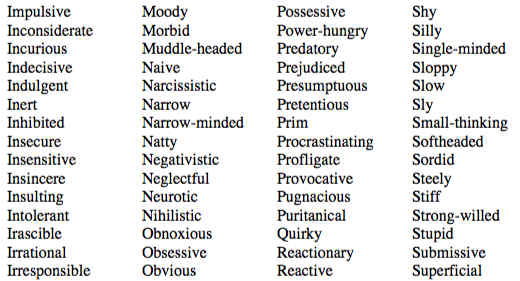

A romantic might start an affair and cause complications in their relationships.This information could create conflict and might force them to act or react. A helpful or scrupulous character may inadvertently find out information when they are lending a hand.An unreliable character might lose a job and the course of the story will change.

When you know what your characters’ traits are, you can use this to add to or to change your plot. Include them when you complete the character questionnaires for your fictional creations. Make sure you have created real people rather than caricatures by giving your cast a selection of both. Tips For Including Character TraitsĮven if you adore your protagonist and loathe your antagonist, it is important to remember that nobody is perfectly good, or perfectly evil.Įvery character will have positive and negative personality traits. Some synonyms used for the word ‘trait’ are: attribute, characteristic, feature, particularity, peculiarity, quality. We all have good and bad character traits and we should remember this when we describe people. Traits are formed by a person’s behaviour and attitude to others. It can be a genetically determined characteristic. What Is A Character Trait?Ī trait is a distinguishing quality or characteristic, typically one belonging to a person. Use these lists of 350 character traits to help you select the positive and negative traits you need for the characters in your stories.


 0 kommentar(er)
0 kommentar(er)
